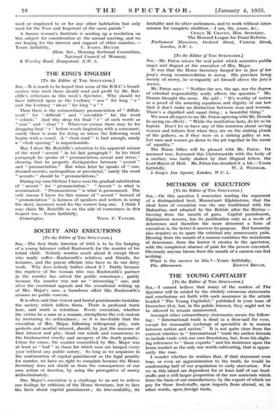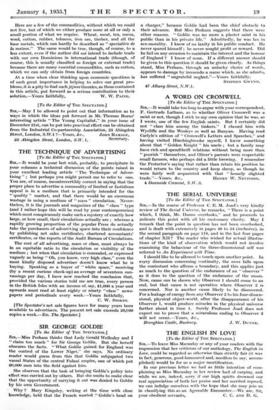THE YOUNG CAPITALIST
[To the Editor of THE SPECTATOR.] cannot believe that many of the readers of The Spectator will be misled by the wholely erroneous statements and conclusions set forth with such assurance in the article headed " The Young Capitalist," published in your issue of December 21st; but, in the public interest, they ought not to be allowed to remain unanswered.
Amongst other extraordinary statements occurs the follow- ing ; " International trade is dead as a door-nail for ever,
except for reasonable exchange of specialitis de la maisan between nation and nation." It is not quite clear from the context whether in " International " trade the author intends to include trade with our own Dominions, but, from his slight- ing references to " those exports " and his insistence upon the home market as the only one worth cultivating, that is appar- ently the case.
I wonder whether he realizes that, if that statement were true, or even an approximation to the truth, he would be condemning half of our population to early starvation. For we in this island are dependent for at least half of our food- stuffs and a still larger proportion of the raw materials which form the basis of our manufactures, by the export of which we pay for those food-stuffs, upon imports from abroad, or, in other words, uponforeign trade. Here are a few of the commodities, without which we could not live, but of which we either produce none at all or only a small portion of what we require. Wheat, meat, tea, cocoa, wool, cotton, rubber, tobacco, iron ore, timber, and all the base metals; which can hardly be described as " specialitis de la maison." The same would be true, though, of course, to a less extent, even if the author did not intend to include trade with our own Dominions in international trade (though, of course, this is usually classified as foreign or external trade) because there are many essential commodities, such as cotton, which we can only obtain from foreign countries.
At a time when clear thinking upon economic questions is of such great importance in helping to solve our great pro- blems,-it is a pity to find such jejune theories, as those contained in this article, put forward as a serious contribution to their







































 Previous page
Previous page